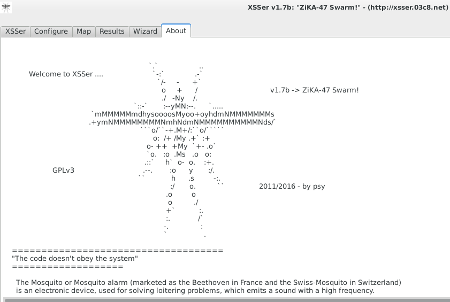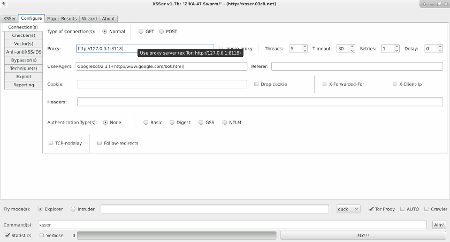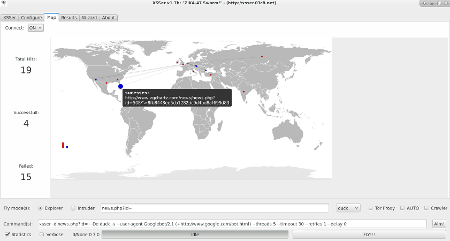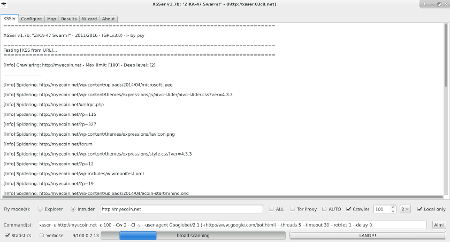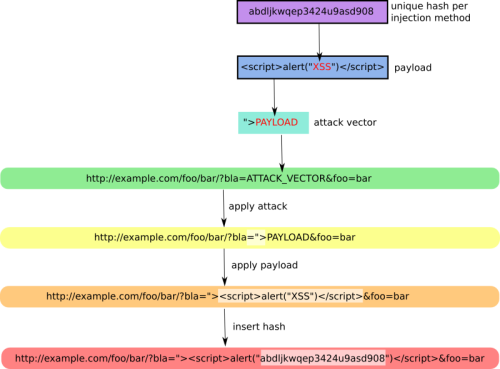This site is the archived OWASP Foundation Wiki and is no longer accepting Account Requests.
To view the new OWASP Foundation website, please visit https://owasp.org
OWASP XSSER
| OWASP XSSer Project Web application vulnerability scanner / Security auditor | |||||||
|---|---|---|---|---|---|---|---|
| Project Name | XSSer: "The Cross Site Scripting Framework" | ||||||
| Short Project Description |
Cross Site "Scripter" is an automatic -framework- to detect, exploit and report XSS vulnerabilities in web-based applications. It contains several options to try to bypass certain filters, and various special techniques of code injection. | ||||||
| Key Project Information | Project Leader psy |
Mailing List Subscribe - Use |
License GNU GPLv3 |
Project Type Pentesting tool |
Support NLNet Awards OWASP tool | ||
| Last Package | Main Links | Related Documentation |
|---|---|---|
| "(v1.7-1b) "ZiKA-47 Swarm!" | Official site Code Releases |
Paper(2009): 'XSS for fun and profit': English - Spanish |
Current Version
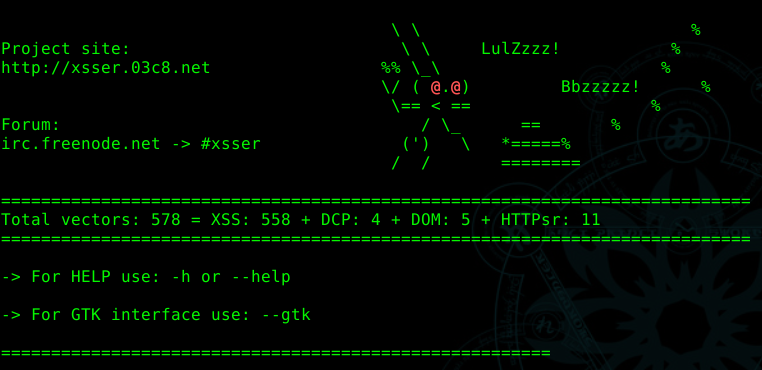 XSSer v1.7-1b ("The Mosquito: ZiKA-47 Swarm")
$ git clone https://github.com/epsylon/xsser-public This version include more features on the GTK+ interface: xsser --gtk |
||||
|
|
How it works
Installation
XSSer runs on many platforms. It requires Python and the following libraries:
- python-pycurl - Python bindings to libcurl
- python-xmlbuilder - create xml/(x)html files - Python 2.x
- python-beautifulsoup - error-tolerant HTML parser for Python
- python-geoip - Python bindings for the GeoIP IP-to-country resolver library
On Debian-based systems (ex: Ubuntu), run:
$ sudo apt-get install python-pycurl python-xmlbuilder python-beautifulsoup python-geoip
Options
xsser [OPTIONS] [--all <url> |-u <url> |-i <file> |-d <dork> (options)|-l ] [-g <get> |-p <post> |-c <crawl> (options)]
[Request(s)] [Checker(s)] [Vector(s)] [Anti-antiXSS/IDS] [Bypasser(s)] [Technique(s)] [Final Injection(s)] [Reporting] {Miscellaneous}
--version show program's version number and exit -h, --help show this help message and exit -s, --statistics show advanced statistics output results -v, --verbose active verbose mode output results --gtk launch XSSer GTK Interface --wizard start Wizard Helper!
*Special Features*: You can set Vector(s) and Bypasser(s) to build complex scripts for XSS code embedded. XST allows you to discover if target is vulnerable to 'Cross Site Tracing' [CAPEC-107]:
--imx=IMX IMX - Create an image with XSS (--imx image.png) --fla=FLASH FLA - Create a flash movie with XSS (--fla movie.swf) --xst=XST XST - Cross Site Tracing (--xst http(s)://host.com)
*Select Target(s)*: At least one of these options must to be specified to set the source to get target(s) urls from:
--all=TARGET Automatically audit an entire target -u URL, --url=URL Enter target to audit -i READFILE Read target(s) urls from file -d DORK Search target(s) using a query (ex: 'news.php?id=') -l Search from a list of 'dorks' --De=DORK_ENGINE Use this search engine (default: duck) --Da Search massively using all search engines
*Select type of HTTP/HTTPS Connection(s)*: These options can be used to specify which parameter(s) we want to use as payload(s) to inject:
-g GETDATA Send payload using GET (ex: '/menu.php?q=') -p POSTDATA Send payload using POST (ex: 'foo=1&bar=') -c CRAWLING Number of urls to crawl on target(s): 1-99999 --Cw=CRAWLER_WIDTH Deeping level of crawler: 1-5 (default 3) --Cl Crawl only local target(s) urls (default TRUE)
*Configure Request(s)*: These options can be used to specify how to connect to the target(s) payload(s). You can choose multiple:
--cookie=COOKIE Change your HTTP Cookie header --drop-cookie Ignore Set-Cookie header from response --user-agent=AGENT Change your HTTP User-Agent header (default SPOOFED) --referer=REFERER Use another HTTP Referer header (default NONE) --xforw Set your HTTP X-Forwarded-For with random IP values --xclient Set your HTTP X-Client-IP with random IP values --headers=HEADERS Extra HTTP headers newline separated --auth-type=ATYPE HTTP Authentication type (Basic, Digest, GSS or NTLM) --auth-cred=ACRED HTTP Authentication credentials (name:password) --proxy=PROXY Use proxy server (tor: http://localhost:8118) --ignore-proxy Ignore system default HTTP proxy --timeout=TIMEOUT Select your timeout (default 30) --retries=RETRIES Retries when the connection timeouts (default 1) --threads=THREADS Maximum number of concurrent HTTP requests (default 5) --delay=DELAY Delay in seconds between each HTTP request (default 0) --tcp-nodelay Use the TCP_NODELAY option --follow-redirects Follow server redirection responses (302) --follow-limit=FLI Set limit for redirection requests (default 50)
*Checker Systems*: These options are useful to know if your target is using filters against XSS attacks:
--hash send a hash to check if target is repeating content
--heuristic discover parameters filtered by using heuristics
--discode=DISCODE set code on reply to discard an injection
--checkaturl=ALT check reply using: alternative url -> Blind XSS
--checkmethod=ALTM check reply using: GET or POST (default: GET)
--checkatdata=ALD check reply using: alternative payload
--reverse-check establish a reverse connection from target to XSSer to
certify that is 100% vulnerable (recommended!)
*Select Vector(s)*: These options can be used to specify injection(s) code. Important if you don't want to inject a common XSS vector used by default. Choose only one option:
--payload=SCRIPT OWN - Inject your own code --auto AUTO - Inject a list of vectors provided by XSSer
*Anti-antiXSS Firewall rules*: These options can be used to try to bypass specific WAF/IDS products. Choose only if required:
--Phpids0.6.5 PHPIDS (0.6.5) [ALL] --Phpids0.7 PHPIDS (0.7) [ALL] --Imperva Imperva Incapsula [ALL] --Webknight WebKnight (4.1) [Chrome] --F5bigip F5 Big IP [Chrome + FF + Opera] --Barracuda Barracuda WAF [ALL] --Modsec Mod-Security [ALL] --Quickdefense QuickDefense [Chrome]
*Select Bypasser(s)*: These options can be used to encode vector(s) and try to bypass possible anti-XSS filters. They can be combined with other techniques:
--Str Use method String.FromCharCode()
--Une Use Unescape() function
--Mix Mix String.FromCharCode() and Unescape()
--Dec Use Decimal encoding
--Hex Use Hexadecimal encoding
--Hes Use Hexadecimal encoding with semicolons
--Dwo Encode IP addresses with DWORD
--Doo Encode IP addresses with Octal
--Cem=CEM Set different 'Character Encoding Mutations'
(reversing obfuscators) (ex: 'Mix,Une,Str,Hex')
*Special Technique(s)*: These options can be used to inject code using different XSS techniques. You can choose multiple:
--Coo COO - Cross Site Scripting Cookie injection --Xsa XSA - Cross Site Agent Scripting --Xsr XSR - Cross Site Referer Scripting --Dcp DCP - Data Control Protocol injections --Dom DOM - Document Object Model injections --Ind IND - HTTP Response Splitting Induced code --Anchor ANC - Use Anchor Stealth payloader (DOM shadows!)
*Select Final injection(s)*: These options can be used to specify the final code to inject on vulnerable target(s). Important if you want to exploit 'on-the-wild' the vulnerabilities found. Choose only one option:
--Fp=FINALPAYLOAD OWN - Exploit your own code --Fr=FINALREMOTE REMOTE - Exploit a script -remotely- --Doss DOSs - XSS (server) Denial of Service --Dos DOS - XSS (client) Denial of Service --B64 B64 - Base64 code encoding in META tag (rfc2397)
*Special Final injection(s)*: These options can be used to execute some 'special' injection(s) on vulnerable target(s). You can select multiple and combine them with your final code (except with DCP code):
--Onm ONM - Use onMouseMove() event --Ifr IFR - Use <iframe> source tag
*Reporting*: --save export to file (XSSreport.raw) --xml=FILEXML export to XML (--xml file.xml)
*Miscellaneous*: --silent inhibit console output results --no-head NOT send a HEAD request before start a test --alive=ISALIVE set limit of errors before check if target is alive --update check for latest stable version
Contact
Irc:
* irc.freenode.net - channel: #xsser
Project Leader:
* psy - 03c8.net
